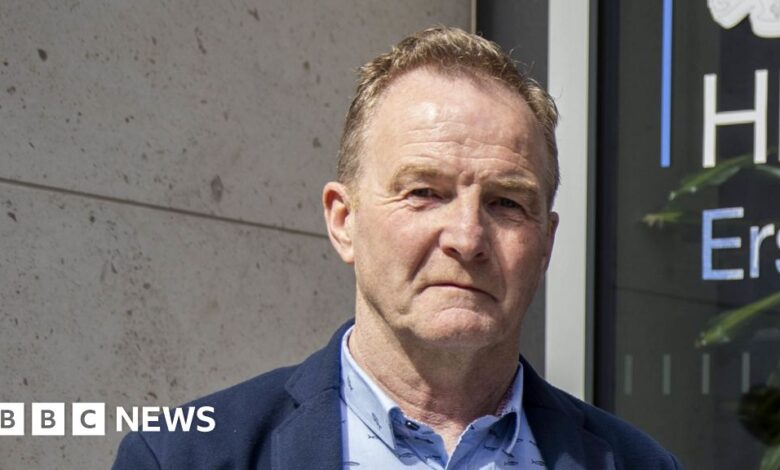JJ Magee suspended over alleged inappropriate online messages

 PA Media
PA MediaSinn Féin has said that Belfast City councillor JJ Magee has been suspended from the party “without prejudice” after an allegation that inappropriate online messages were exchanged between him and a minor.
Sinn Féin National Chairperson Declan Kearney said that the party whip had been removed and the allegations were forwarded to social services and police in compliance with the party’s safeguarding policy.
The Police Service of Northern Ireland (PSNI) said it received a report in June 2024 but “no criminal offences were detected”.
Magee’s lawyer KRW Law said he “denies any allegation of inappropriate conduct and in particular any conduct which may have occasioned a breach of the code of conduct for councillors”.
 Getty Images
Getty Images“Safeguarding assessments and engagement with other statutory bodies were conducted at that time,” a PSNI spokeswoman said.
Kearney said the chief executive of Belfast City Council has been notified.
Sinn Féin said it would be making no further comment as the matter is “under active investigation by the appropriate authorities”.
Belfast City Council held a meeting on Monday evening, but Magee did not attend.
‘No substance’
The KRW Law statement described the complaint as “malicious, selective and edits significant portions of messages sent and received over a three-month period which deprived the Commissioner of the opportunity to appropriately assess whether the threshold for initiating a complaint procedure had been met”.
“The complainant acknowledges that she has been advised by unknown and unnamed advisor(s) in the preparation of her complaint.”
The KRW Law statement added that JJ Magee had lodged a 38-page rebuttal to a complaint which had been lodged with the NI Local Government Commissioner for Standards.
The statement also said that Magee did not alert Sinn Féin to the complaint as he believed there was no substance to it and that it would be quickly resolved once all the facts were provided.
It added that their client looks forward to “having his good name restored”.
The office of the Northern Ireland Local Government Commissioner for Standards said they received a report of a potential breach of the code of conduct and that “the allegation is now under investigation”.
Recent controversies
Sinn Féin leader Mary Lou McDonald has come under pressure over her party’s handing of recent safeguarding issues.
The controversy was sparked after it was revealed that two Sinn Féin press officers gave references for a former colleague, Michael McMonagle, who was later convicted of child sex offences.
Further revelations emerged about a former Lord Mayor of Belfast, Niall Ó Donnghaile, who sent inappropriate text messages to a youth member of the party.
Another party member, Brian Stanley, resigned in October after a complaint against him that saw him brought before an internal party inquiry.
McDonald told the Dáil (Irish parliament) his resignation is not related to matters of child protection, but the allegations were still “very, very serious”.
Stanley denies any misbehaviour.
Speaking on Monday night, McDonald said she does not “flinch” from taking “disciplinary action” when action is required.
“Any compliant that is made on any matter is taken seriously,” she said.
“You can’t legislate for human behaviour, but what you can do is ensure that you have the appropriate responses were difficulties arise,” she added.
 PA Media
PA MediaAnalysis: Safeguarding policy will be back in the spotlight
Sinn Féin had hoped to turn a page this week and slip into full campaign mode with the election due to be called in the Republic.
But, instead of answering questions about housing and health, the party will be quizzed about another suspended politician accused of sending inappropriate texts.
The party’s child safeguarding policy will be back in the spotlight.
While such controversies don’t always cut through to voters, they do use up valuable airtime.
They also keep the party on the back foot at a time when it needs to be in full political attack mode.





